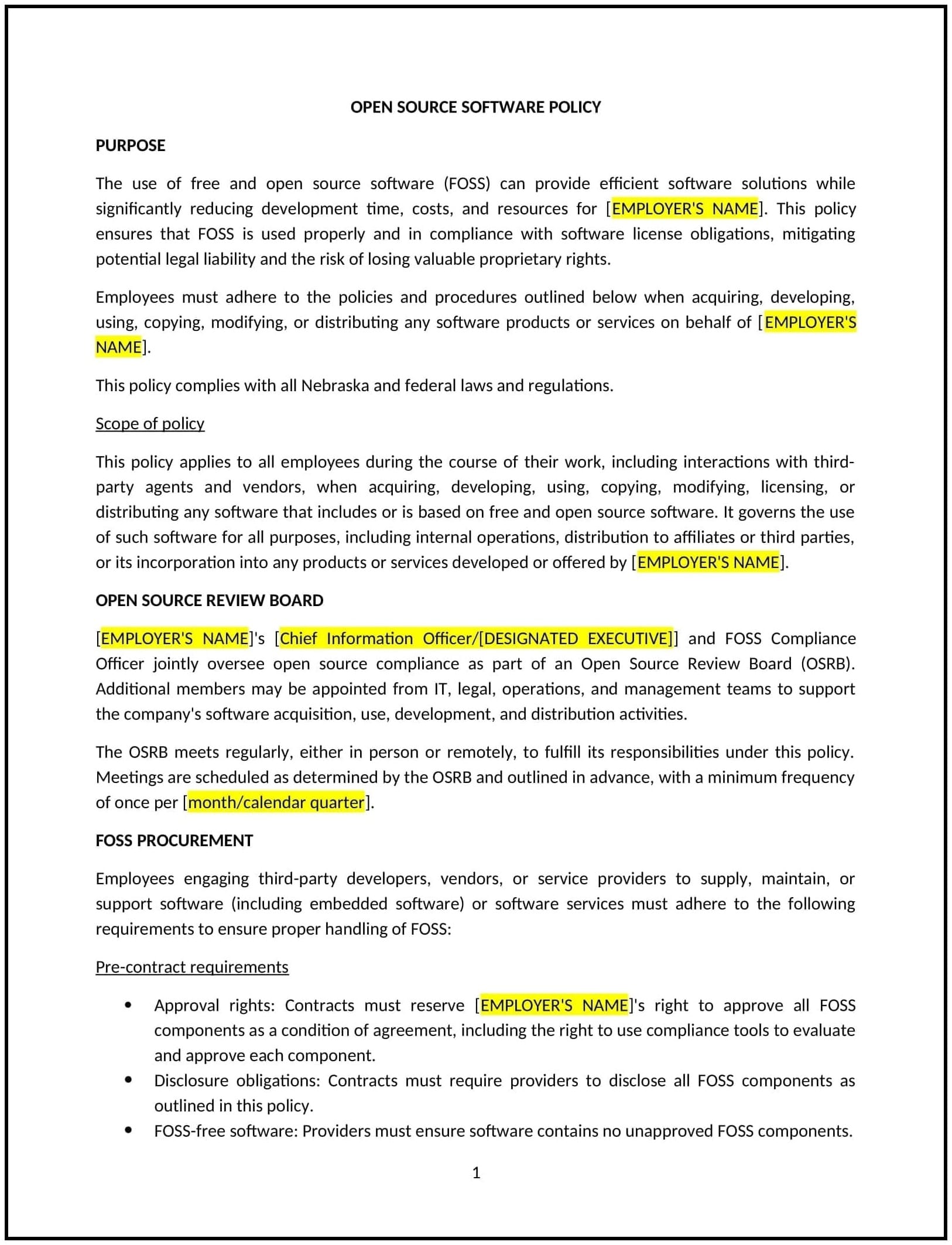Open source software policy (Nebraska): Free template
Got contracts to review? While you're here for policies, let Cobrief make contract review effortless—start your free review now.

Customize this template for free
Open source software policy (Nebraska)
An open source software policy helps Nebraska businesses establish guidelines for using, contributing to, and managing open source software (OSS) in their operations. This policy is designed to promote innovation, cost-effectiveness, and transparency while addressing legal, security, and operational considerations. Tailored to Nebraska’s business environment, this policy ensures that businesses can leverage OSS responsibly and align with their strategic goals.
By implementing this policy, businesses in Nebraska can harness the benefits of open source software while minimizing risks and maintaining compliance with licensing and security requirements.
How to use this open source software policy (Nebraska)
- Define open source software: Clearly explain what constitutes open source software and its characteristics, such as publicly available source code and licensing terms.
- Establish approval processes: Create a process for evaluating and approving the use of OSS in business operations, including legal and technical reviews.
- Address licensing requirements: Outline how businesses should comply with OSS licenses, including attribution, redistribution, and modification terms.
- Set contribution guidelines: Provide guidelines for contributing to open source projects, including code quality, intellectual property considerations, and approval workflows.
- Ensure security and maintenance: Specify how businesses should monitor and maintain OSS for security vulnerabilities and updates.
- Train employees: Educate staff on the policy’s guidelines, including proper use, licensing compliance, and contribution practices.
- Document usage: Maintain records of all OSS used in the business, including licenses, versions, and purposes.
- Review and update the policy: Periodically assess the policy’s effectiveness and make adjustments as needed to reflect changes in technology, legal requirements, or business needs.
Benefits of using this open source software policy (Nebraska)
This policy offers several advantages for Nebraska businesses:
- Promotes innovation: Open source software provides access to cutting-edge tools and technologies that can drive business innovation.
- Reduces costs: Leveraging OSS can lower software acquisition and licensing expenses.
- Enhances transparency: Using OSS allows businesses to review and modify source code, increasing transparency and control.
- Supports collaboration: Contributing to open source projects can foster collaboration with the broader developer community.
- Aligns with Nebraska values: The policy reflects the state’s emphasis on innovation, resourcefulness, and community engagement.
- Improves flexibility: OSS allows businesses to customize software to meet their specific needs.
- Encourages best practices: A formal policy ensures responsible use of OSS and compliance with licensing and security requirements.
Tips for using this open source software policy (Nebraska)
- Communicate the policy effectively: Share the policy with employees during onboarding and through regular reminders, such as emails or training sessions.
- Provide training: Educate employees on the proper use of OSS, licensing requirements, and contribution guidelines.
- Monitor usage: Regularly review the OSS used in the business to ensure compliance with licenses and security standards.
- Engage legal and technical teams: Involve legal and technical experts in evaluating OSS for compliance and suitability.
- Encourage contributions: Support employees who contribute to open source projects by providing resources and recognition.
- Stay updated: Keep track of updates and security patches for OSS to maintain operational integrity.
- Review the policy periodically: Update the policy as needed to reflect changes in technology, legal requirements, or business needs.